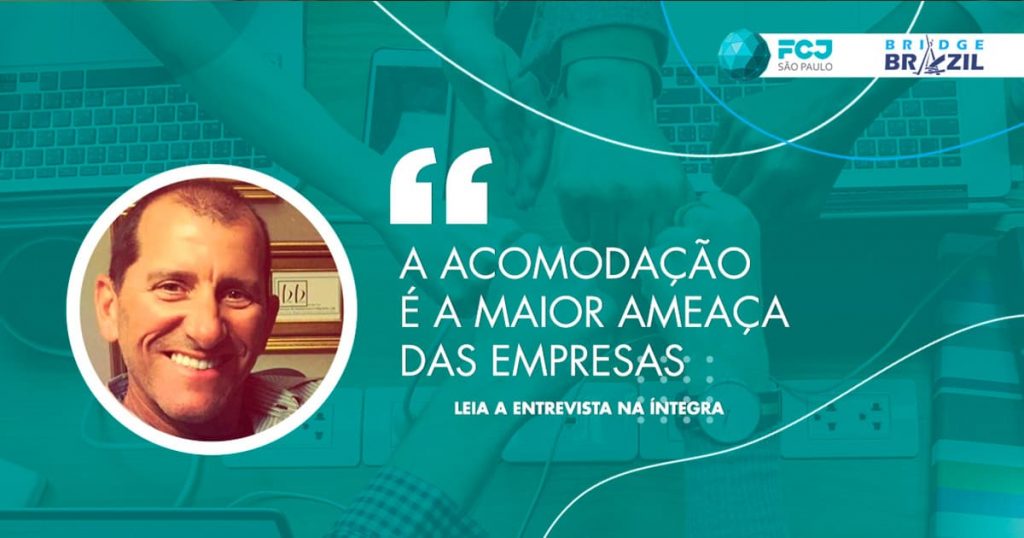“Accommodation is the biggest threat for companies”, says creator and investor of FCJ
For the creator and investor of FCJ São Paulo, Jorge Letra, the new coronavirus pandemic is a decisive moment for companies. With more than 25 years of experience in the market, in this interview he talks about how he is dealing with the startups in which he invests, the digital acceleration process and the growth opportunities for companies, entrepreneurs and investors and leaves valuable tips for those who want to start undertake and become an angel investor. Check out! Faced with these changes in the mode of production and consumption patterns, will the market undergo a process of accelerating digitization, as some experts say, “creative destruction”, and will companies that are not up to date cease to exist? It is a turning point for many companies. I’ve always been an “early adopter” and that’s why, for me, these turning points are very inspiring. But the truth is, they are pretty scary too. Several companies were caught in a phase of fragility and did not even have time to react. Others haven’t closed yet, and stubbornly go into debt in the hope of surviving, but without the cash to make the necessary changes for this new era, they probably won’t survive, because the old customers will be wanting the same things more. However, many companies are taking the opportunity to reinvent themselves and making the digital transformation in an accelerated way to find new markets and new customers. They create new channels, new products and services, new customer relationships, and change their level of operation. Will all companies go through these changes? Yes. We will see serious changes in small companies and large companies alike. What large companies need to do is regain the restlessness that made them leaders after they grew up. Accommodation is the biggest threat to companies. They don’t want to take any risks and want to increase their profits arithmetically based on inflation, market growth or other rational metrics. Your leaders get more comfortable, slower, and stop seeing the world as a challenge. They think they already know how the world is. It is also true that they are charged as if they had to know, and that is why they project the future that suits them and their budgets. Finally, in this chaos, leaders can say they don’t know what the future will be without anyone being surprised. It is a great moment of freedom, awareness and learning. What was your initial reaction to the pandemic with the 50+ startups you invest in and how are you dealing with the crisis? As in any crisis, the first moment is one of denial. But companies need to learn at once that the only secure future is the one we create ourselves. So they need to continually innovate and change to have a more predictable future. If I, the market leader, am not creating the future because I am too busy with the present, then some other company will create that future and surprise me. Today is easier than in the past. Startups and technological innovation have already taught us a very interesting and low-cost path. Large companies must join a Venture Builder, a startup factory, to continually seek innovations in their area of expertise. We know that we are going through a moment that requires new skills. Based on your experience with startups, what tips would you give to entrepreneurs? My vision changed a lot, years ago, when I read books like “Startup Lean” by Eric Ries and “Exponential Organizations” by Ismael Salim, among other authors. I myself would have done a lot differently in my 25 years as an executive if I had created this awareness earlier. The tips I leave for all entrepreneurs are: 1) Learn new business development techniques (books, lectures, other entrepreneurs, entrepreneurs, specialists); 2) Understand their area of excellence, what makes them different and much better than other entrepreneurs, because it is there, and only there, that they must act; 3) Look for customer problems/pain, understand their causes and consequences. Talk to lots of people about what they’re looking for; 4) Make by hand, “on a napkin”, the first sketches of what needs to be solved and how to solve it; 5) Start solving the smallest problem, with the least possible cost, to test the first hypotheses; 6) Seek help to grow. Finally, repeat steps 3, 4, 5, and 6 over and over until you are good and big. Even during the crisis? If you are in the midst of a pandemic crisis like the one we are experiencing today, you have to take care of the house. Take care of your health and the health of your employees. As we were always told on planes, in case of turbulence, put the mask on yourself first, only then help others. Welcome your customers and markets. Identify and talk to your ICP (Ideal Customer Profile). See what they need, give a discount so you don’t lose the customer, feel what you can do more for them. New features, new solutions, new immediate demands are usually excellent ways to get out of the crisis and become indispensable for your customers. It’s time for B2B back to breakeven. Cut everything until you ensure the operation pays for itself with current sales. Only then think about doing something different. Accelerate: new plans for new times. Reinvent everything based on what will be and not what has always been. Get ready for the future. To know where we are going, we need to know where we are. Recognize your new market and accelerate. In the current economic scenario, there has been an increase in the search for knowledge for investments. What tips do you give to those who are starting to be interested in being an angel investor? From all the experience I have acquired as an angel investor, what I can say to anyone who is on this same path right now is: calm seas never made a good sailor. At times like this, nothing stays the same, which is why it’s a great time to meet people and invest in startups. As the main selection factor for a startup is the team, especially the founders, their values and purpose, it is an excellent time to understand who they are. The lifeblood of the business is
“Accommodation is the biggest threat for companies”, says creator and investor of FCJ Read More »

